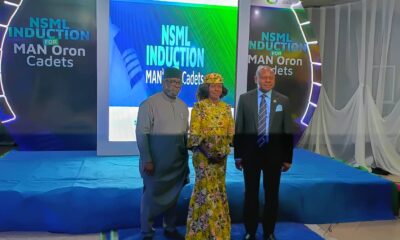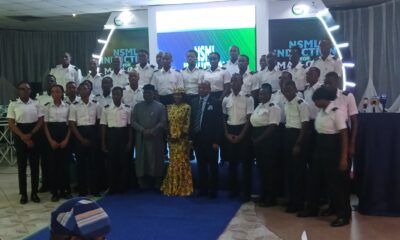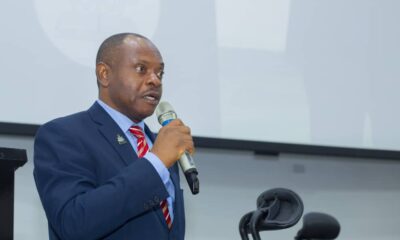Business Focus
Experts Advocate Harmonization of Maritime Security Infrastructure
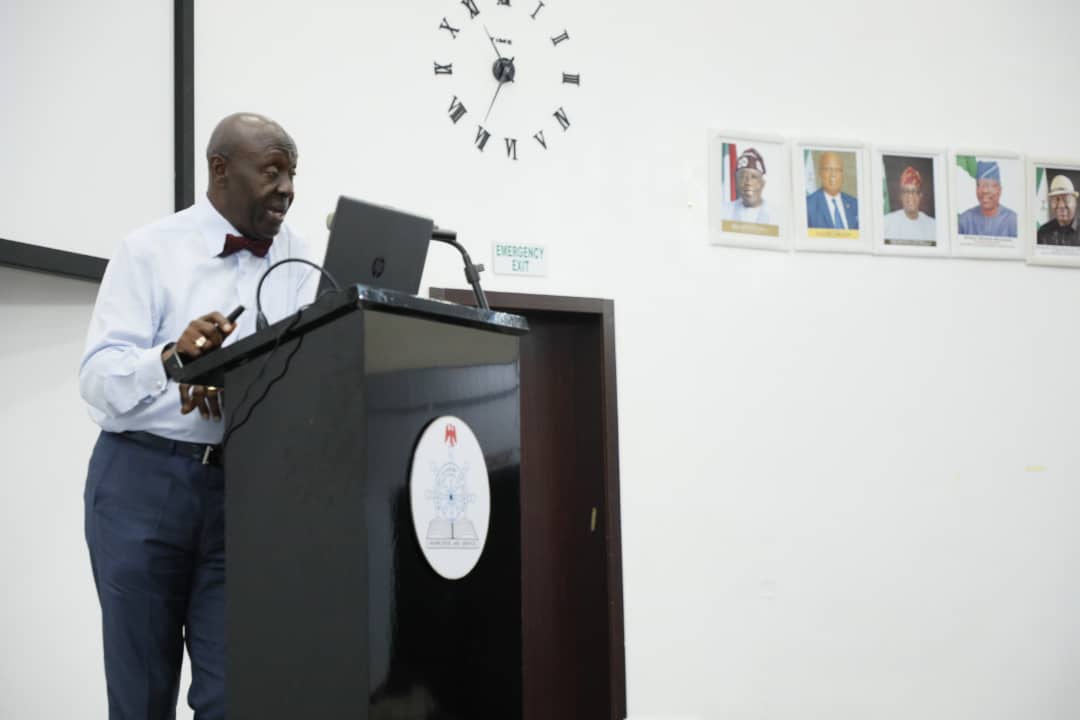
BY EGUONO ODJEGBA
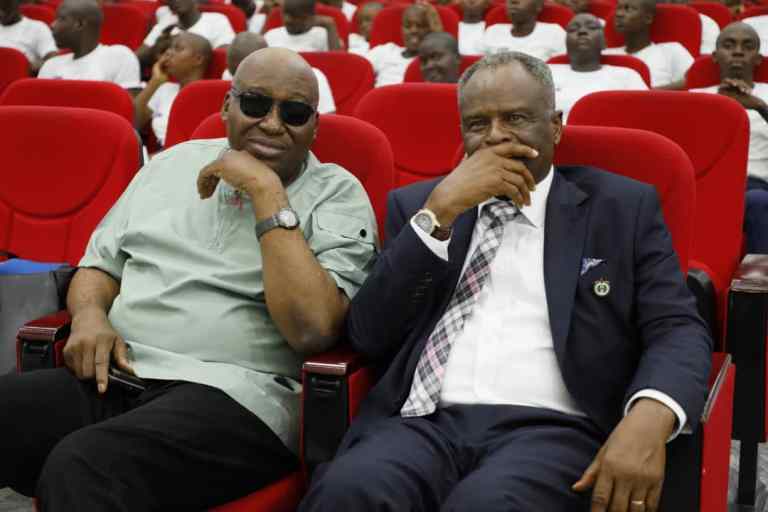
L-R Cdre Effedua and Rear Admiral Akpan during the seminar
Technocrats and industry administrators have canvassed the review and possible collapse of existing maritime security assets and intelligence gathering infrastructure operated by different organizations to enable the country achieve improved its maritime security task.
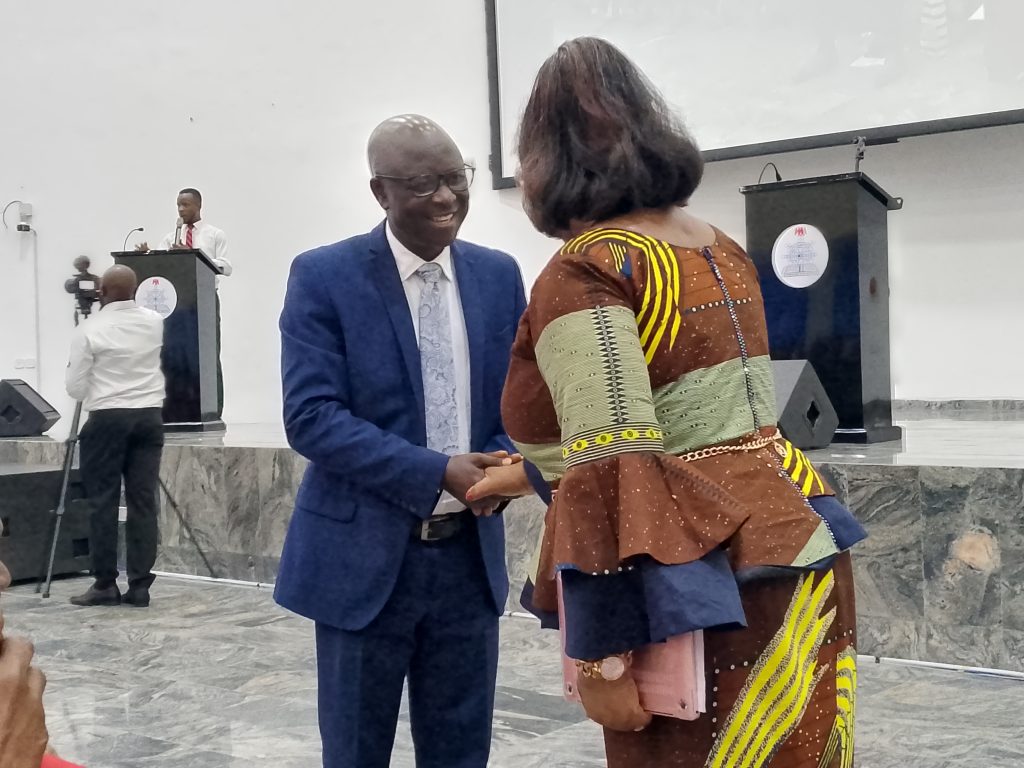
Ag MAN Registrar, Netson in a handshake with Dr. Felicia Mogo after she presented her papers
This is even as a former Chief of Naval Staff, Vice Admiral Dele Joseph Ezeoba (Rtd), have stated that the expansion of Nigeria’s continental shelf from 200 to 350 nautical miles, recently approved by the United Nations comes with additional security responsibilities.
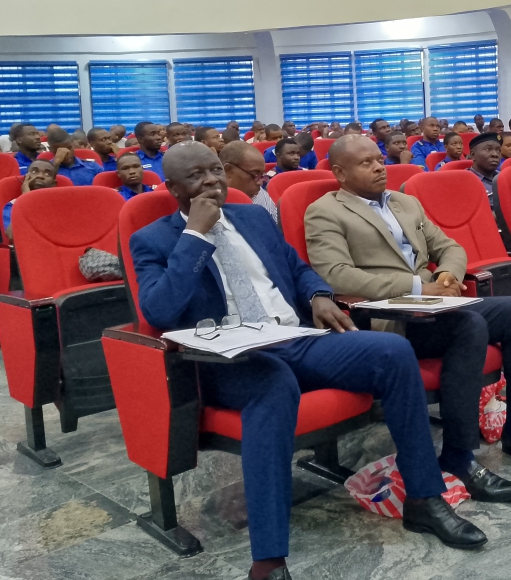
Netson and Dr. Okona listening to one of the presentations
While making presentations at the 2024 Blue Economy Week organized by the Maritime Academy of Nigeria (MAN) for its cadets, the experts also advocated increased utilization of the nation’s expertise in the areas of maritime survey, ship building and other critical services to save cost and further the growth of local maritime capacity.
Delivering a paper on ‘Maritime Domain Awareness: A case Study of Nigeria’s Territorial Waters’, Rear Admiral Austin Oyagha (Rtd) informed that inspite of much efforts concentrated on achieving maritime security, ungoverned spaces has continued to encourage criminal activities.
He therefore advocated greater synergy between the Nigerian Navy (NN), the Nigerian Maritime Administration and Safety Agency (NIMASA) and the Nigerian Port Authority (NPA), by way of harmonizing the management and control of critical security infrastructure in order to achieve greater efficiency; while describing the spread of Nigerian Navy Falcon Eye, NPA’s C31 NIMASA’s C4i as uncoordinated and counterproductive.
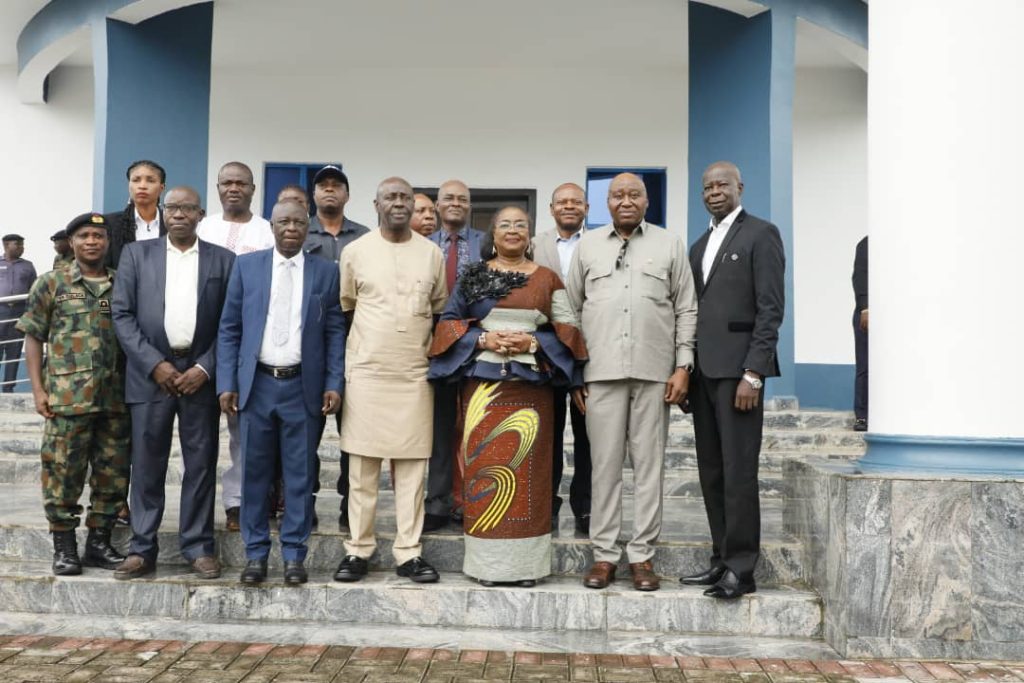
Vice Admiral Ezeoba, third from right, Dr. Mogo, Cdre Effedua and Rear Admiral Oyagha in a group photograph Day 1 after the session
The former Chief of Administration Defence Headquarters notes that a focused, well managed national maritime security assets between the Navy and others will produce greater results and close the gaps that have otherwise manifested over time.
He described the existence of ungoverned spaces a serious deficit due to lack of coordination, which he said is often driven by narrow, political considerations.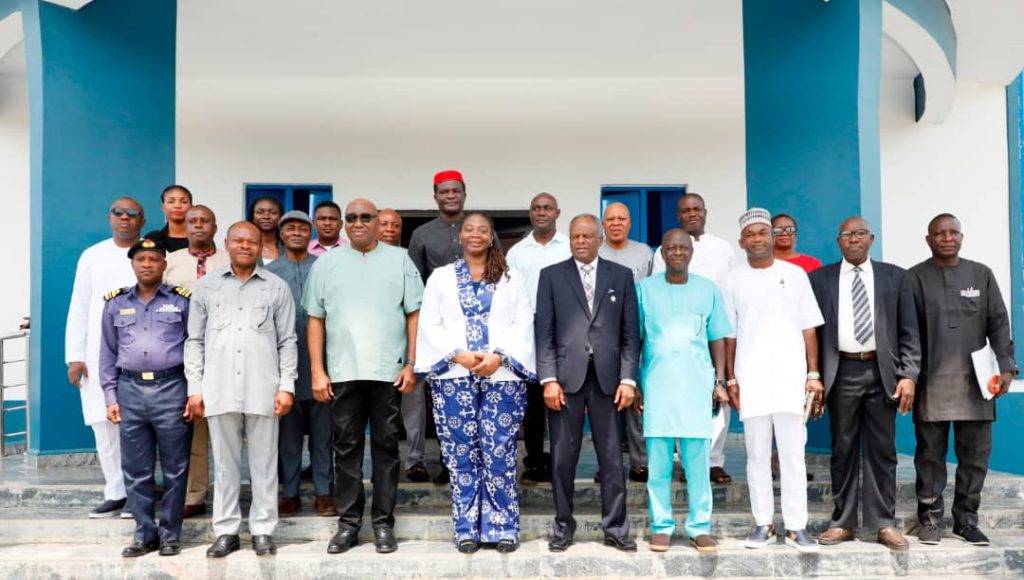
“Nigeria has a coastline of about 420 nautical miles and an Exclusive Economic Zone, EEZ, of 205 nautical miles, thus a maritime area of about 86,100 square nautical miles. This area has navigable inland waterways of about 3,000 km, 6 major seaports, 11 oil terminals, over 170 private jetties and 6 major inland container depots.
“Nigeria depends significantly on her maritime domain because the area generates over 80 per cent of the funds for the country’s national budget. An effective awareness and monitoring of Nigeria’s maritime domain, is thus, necessary to create a positive atmosphere for economic activities”, he said.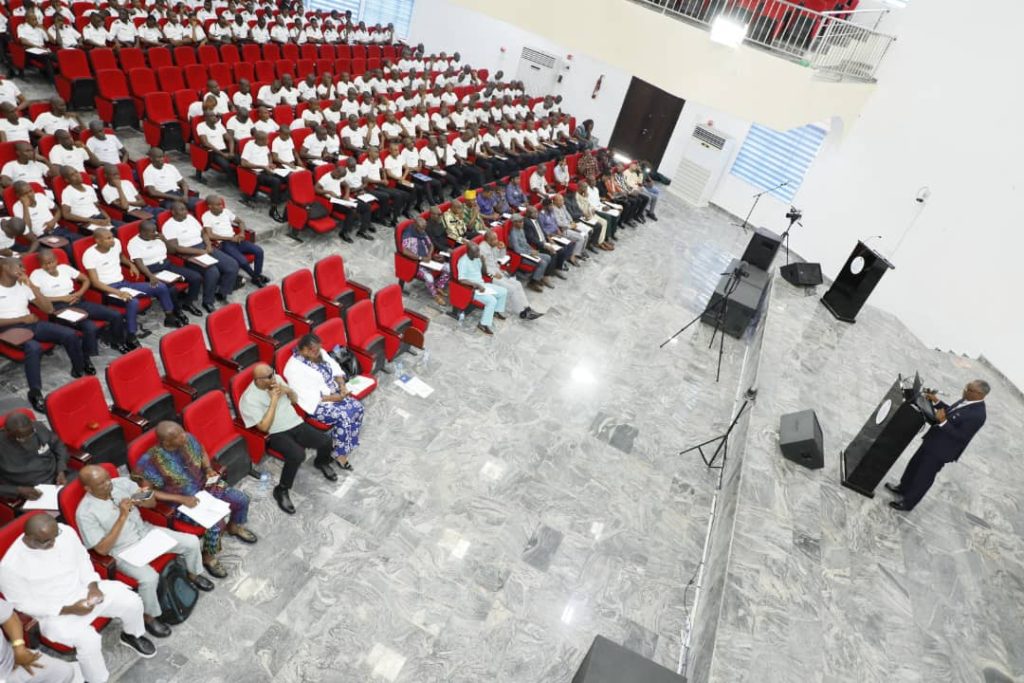
Oyagha explained that the establishment of Regional Maritime Awareness Capability (RMAC) Centre in Lagos in 2007 opened the door to departmentalization of maritime security and the gaps that inevitably followed.
“The NN and APS collaboration also led to the establishment of other RMAC centres and sites at Forward Operating Bases in Bonny, Ibaka and Badagry. The Office of the National Security Adviser (ONSA), Defence Headquarters and NIMASA, monitor the maritime domain through RMAC display units installed at their operations rooms.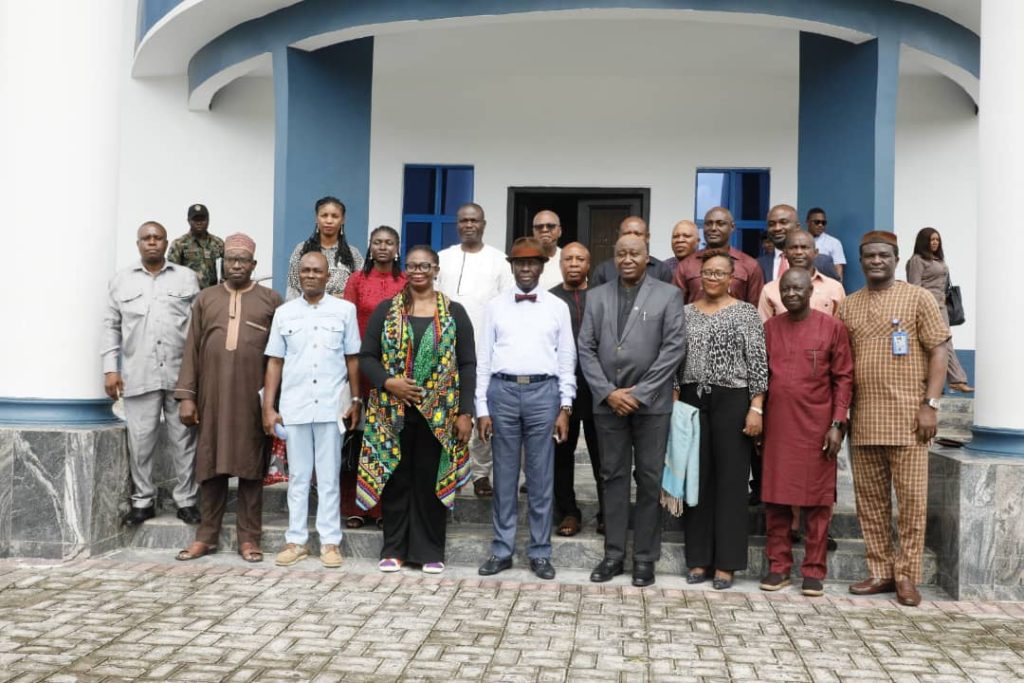
“To improve Nigeria’s MDA capability, the ONSA in 2014 established the Falcon Eye system for the NN. The Falcon Eye, augmented the existing RMAC infrastructure. Other maritime agencies/stakeholders such as NPA and NIMASA also employed satellite based systems to enhance MDA. This includes the Command, Control, Communications and Intelligence, Ci3 for NPA as well as Command, Control, Communications, Computers and Intelligence, Ci4 for NIMASA, which is commonly referred to as the Deep Blue Project.”
According to him, “This duplication of MDA efforts and the fact that some agencies and International Oil Companies have acquired various forms of MDA capability depicts absence of synergy and raises concern for the coordination of MDA among maritime stakeholders.”
While affirming the overall good intentions in the establishments of the various assets and their capacities through various gamuts of collaborations, the retired naval chief noted that a common systems command would achieve greater and efficient result in maritime security.
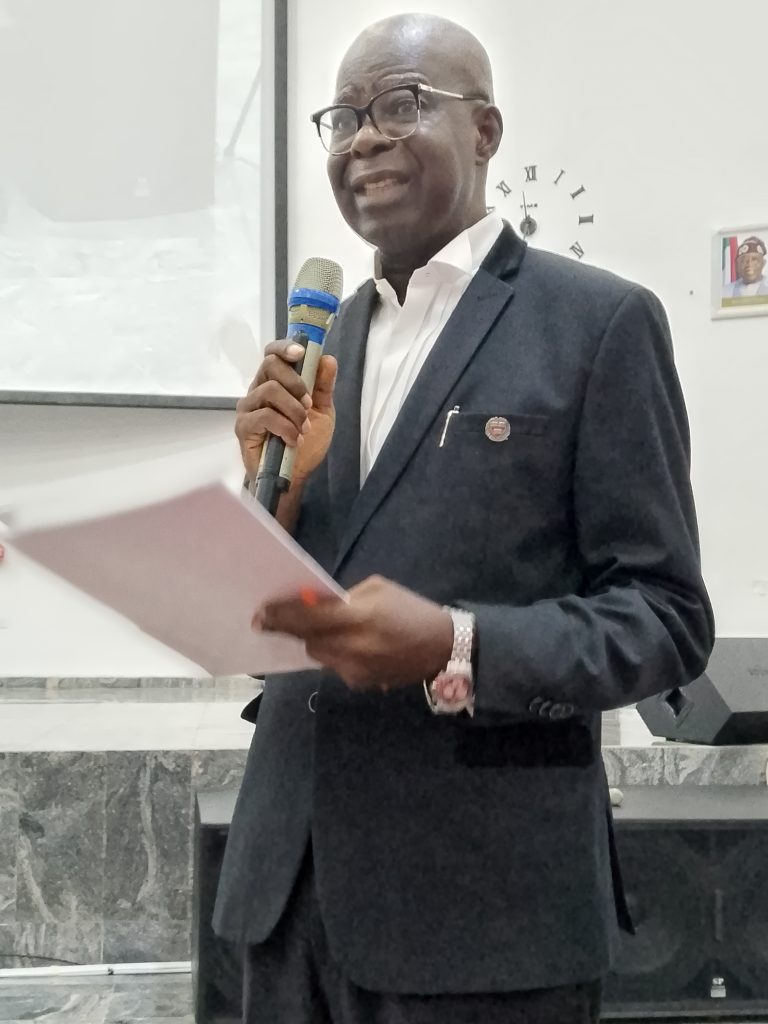
Rear Admiral Oyagha fileding questions from cadets after his presentation
“These facilities have also given a boost to monitoring of activities within the maritime space and contributed to enhancing maritime security in Nigeria. NPA and NIMASA conduct their individual MDA activities, by operating independent surveillance equipment to meet their operational requirement.
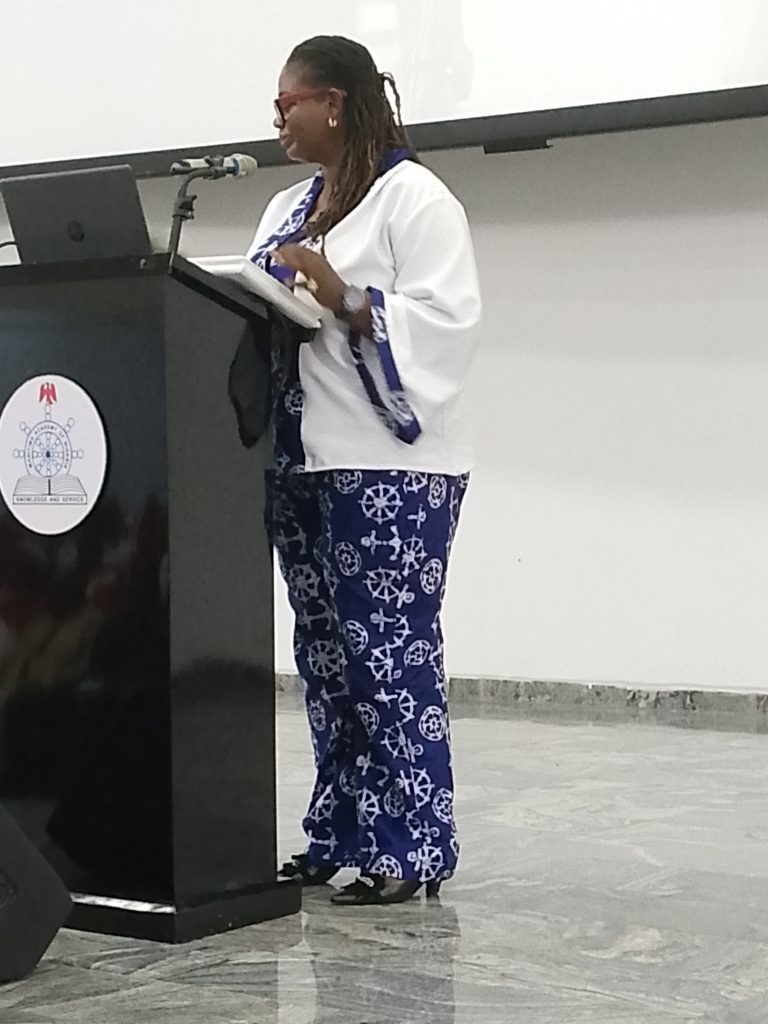
Mrs. Ezinne Azunna presenting her paper

‘In order to ensure the availability of complete maritime picture for effective MDA, it is imperative that these agencies work together by pooling resources and manpower. However, such inter-agency cooperation is still lacking to a large extent, as agencies install equipment without proper liaison and are not obliged to share information among themselves”, he stated.
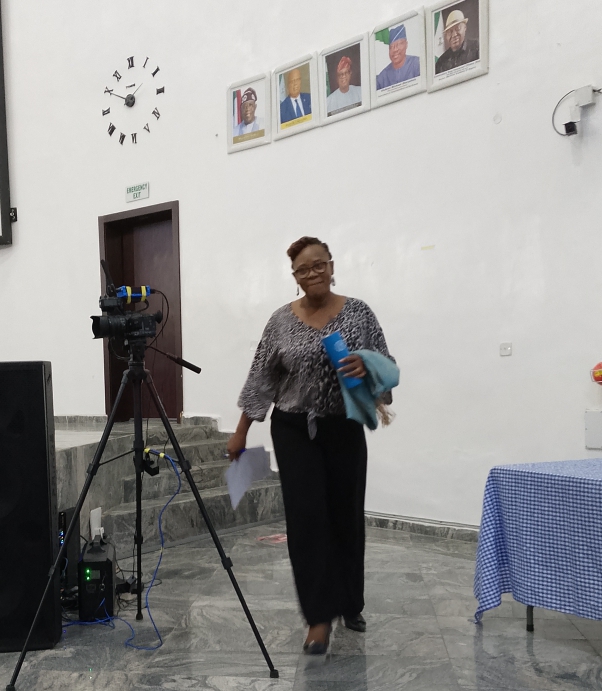
Dr Hope Oriwri walking down the podium after delivering her paper
Reinforcing Oyagha’s position, Vice Admiral Ezeoba delivering a paper titled “Maritime Security Challenges in the Gulf of Guinea” spoke on the impacts of various bilateral and multilateral collaboration aimed at achieving improved maritime security in Nigeria and the sub region; as he marshaled supporting evidence of these efforts in the Gulf of Guinea (GOG).
“The current security challenges in the GoG and its effects on the economy of the region reinforces the need to adopt global maritime partnerships as a strategic option of choice to deal with extant maritime threats which are transactional in nature and also address related capacity inadequacies to ensure a secure and safe GoG maritime domain.”
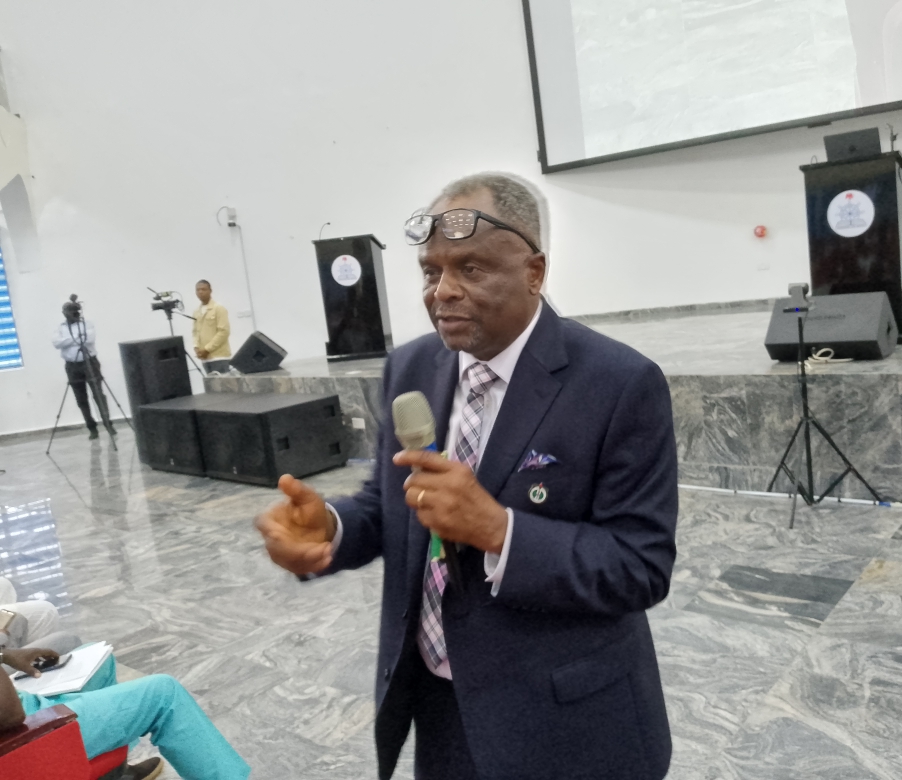
Rear Admiral Akpan taking questions from cadets of the Academy
He notes that with collaboration and harmonization, the huge financial implications of maintaining the required assets which he said has constantly pushed up defence budgets across climes due to emerging global security challenges will prove more efficient and result oriented.
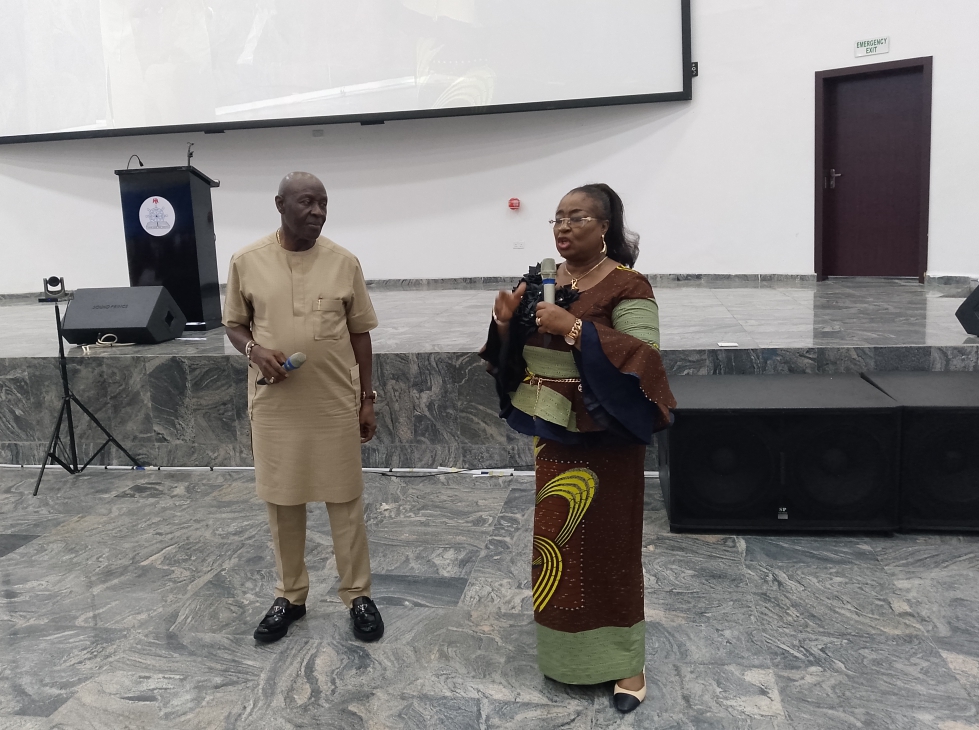
Rear Admiral Ezeoba and Dr. Mogo answering cadets questions after her presentation
This is even as he described the recent expansion of Nigeria’s continental shelf from 200 to 350 nautical miles as a boost to Nigeria’s maritime status, but was quick to add that it comes with additional security responsibilities.
Also speaking on the theme “The Blue Economy: Imperatives for Nigeria”, Rear Admiral Francis Dan Akpan (Rtd) provided a broad based background information on the concept of blue economy, and what it aimed to achieve.
“The idea of the Blue Economy was conceived at the RIO+20 United Nations Conference on Sustainable Development held in Rio de Janeiro on June 2012. This conference addressed Two Key Themes: the further development and refinement of the Institutional Framework for Sustainable Development and the advancement of the concept of the Green Economy.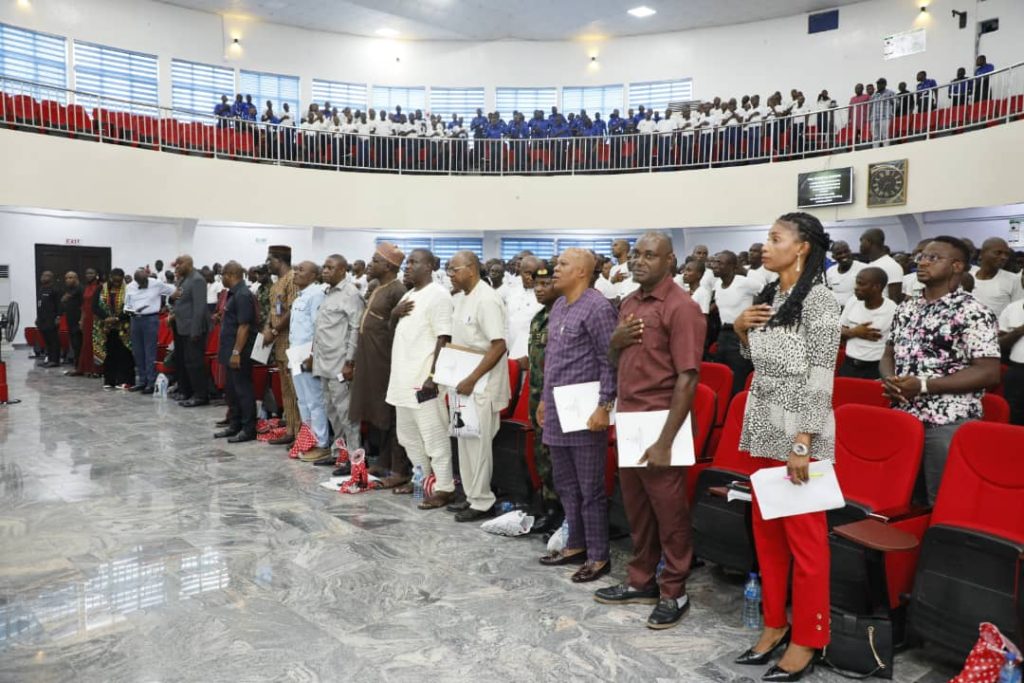
“The outcome was the affirmation that Poverty Eradication was its key challenge, thus there was the focus on the green economy as a tool to achieve both themes: poverty eradication and sustainable development. The Oceans, Seas and Rivers, the maritime domain cover a large proportion of the planet Earth’s Surface. It is made up of more than 95% of the biosphere. They provide much of the World’s Population with food, livelihoods, and it is a significant means of transportation for global trade, constituting more than 90%.
“The potential of the oceans to meet sustainable developments is enormous, only if the oceans can be maintained and restored to a healthy and productive state when exploited.”
Akpan however noted that despite the avalanche of academic postulations in respect of the gains already made, Nigeria he says is at the peripheral and yet to scratch the goldmine.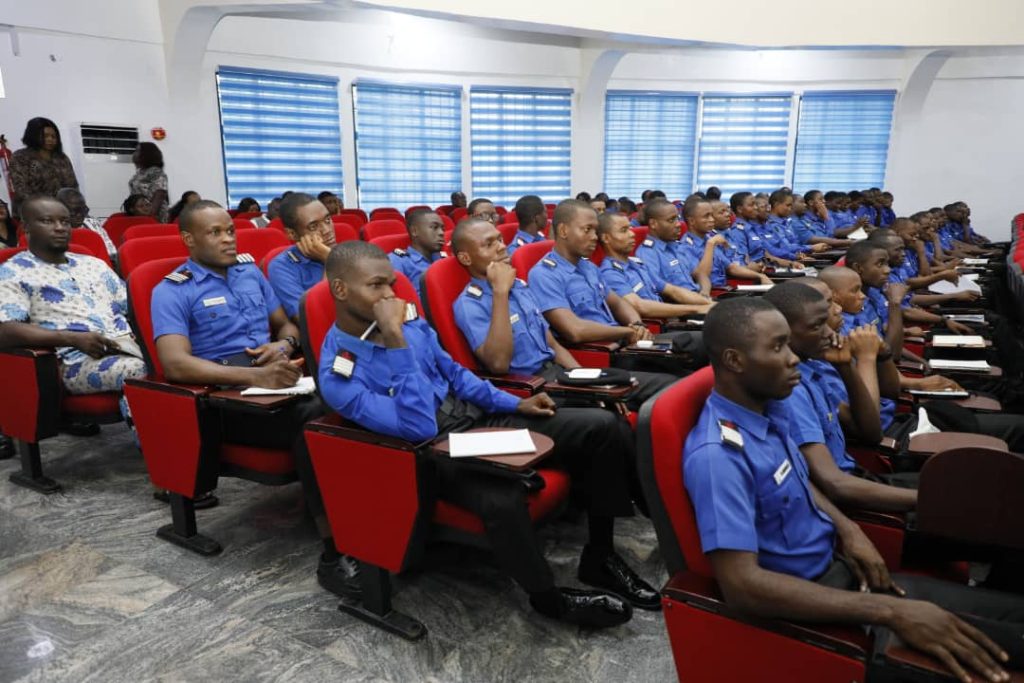
He said, “The opportunities inherent in Nigeria’s Blue Economy Regime remains untapped, as sustainable exploration of the oceans, numerous channels and estuaries, lakes, rivers, creeks among others are undermined by inadequate knowledge, technological capacity and limited investment. Thus, our efforts have remained pedestrian, more elusive and remaining at the subsistence level of our ancestors.
“The opportunities in Tourism, Blue Power Generation remain under-explored and we are not involved in any deep sea-bed exploration due mainly to the lack of insufficient human resources and technological capabilities. Thus, the theme of the 2024 Blue Economy Week in Maritime Academy Oron is germane and appropriate.”
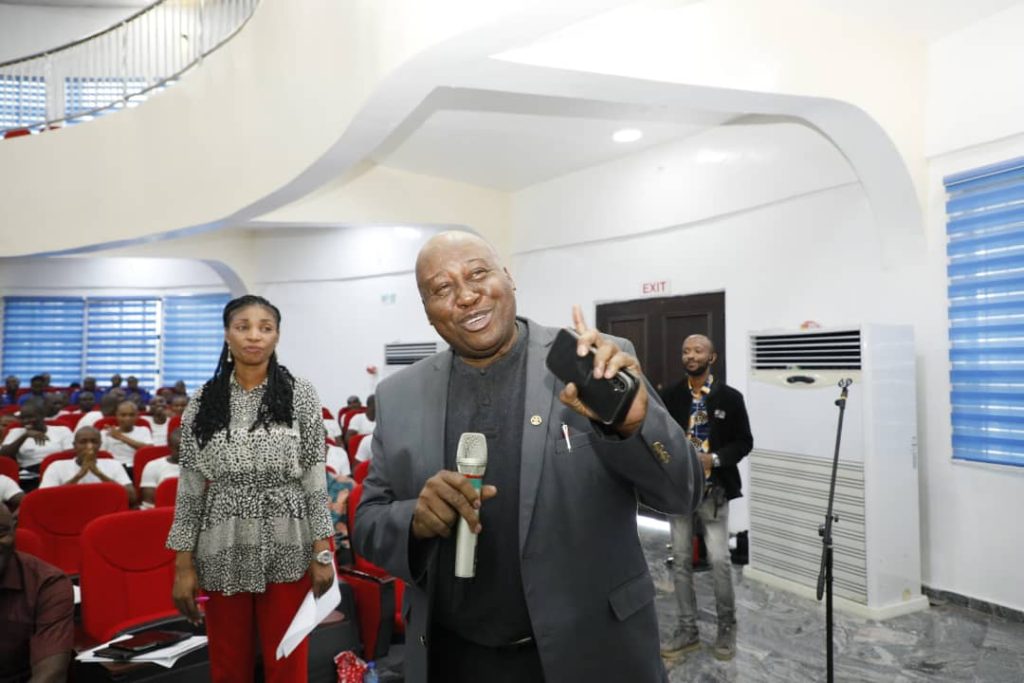
Cdre Effedua explaining some point of interest durig the seminar, with head of the public relations department, Domo Umoekpe watching from the side
Towing the path of other experts who spoke earlier, Akpan called for increased single pool participation to optimize capacity utilization.
“A safe and secure maritime domain is critical for international ocean sea borne trade, job and wealth creation as criteria for the sustainable utilization of the resources within the blue economy.
“This is the time to integrate all maritime domain awareness system for the national good, partnering and engaging with the Navy, Customs, NIMASA and the Marine Police in addressing Maritime Threats.”
Meanwhile, MAN Rector, Commodore D.E Effedua Rtd, in his remark tasked students and cadets of the Academy to demonstrate high level of seriousness in acquainting themselves with the academic and industrial rudiments of the marine and blue economy; noting the blue economy holds the key to immediate future of the nation’s seafarers and maritime economy.
The Rector said the 4-day Blue Economy Week seminar was designed to provide cadets with the necessary awareness of the blue economy concept and to prepare them for life outside the classroom.
“Nigeria is developing its blue economy and as cadets and seafarers, it holds the future for most of you. We have taken you through various levels of academic training but at the end of the day, whatever your specialization, you’ll end up in the marine and blue economy, so it is important you have the essential knowledge.
“So far we have been able to take you through quality training and with all the seafaring training assets including simulators at your disposal, your future is already laid out for you. Just acquaint yourselves with the basic concepts of the blue economy because that is where you will end up upon leaving here”, he said.



